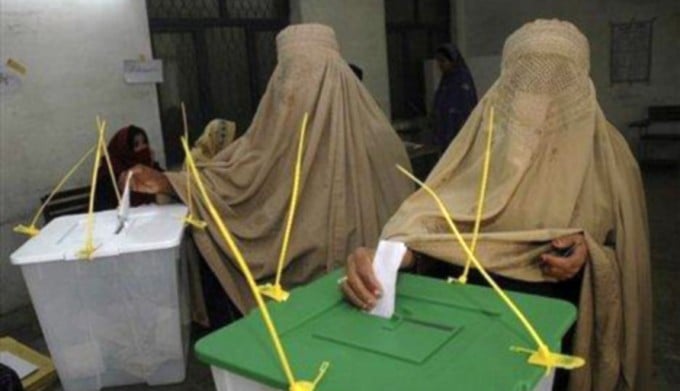
The controversy over stopping women from voting in May 7 by-polls highlights the cause of women voters

A division bench of the Peshawar High Court has suspended re-election in PK-95 on Thursday. The winning candidate and Jamaat-e-Islami’s head for Lower Dir, Aizazul Mulk, had moved the court, maintaining before the two-member bench that women were not barred from polls and those who appeared before the court and claimed that they were barred from voting belonged to NGO. A female MNA of JI, Ayesha Syed, told the court that women willingly did not come out to vote and were not barred. The division bench headed by Chief Justice Mazhar Alam, after hearing the arguments, suspended the ECP’s decision of re-polling in PK-95.
The Election Commission had earlier taken up the issue on June 2 of barring women from polling in May 7 by-elections in PK-95, ordering fresh polls in the constituency in July.
Aizazul Mulk Afkari of the Jamaat-e-Islami won the polls against Bahader Khan of the Awami National Party. The seat was vacated by JI Chief, Sirajul Haq, after he was elected Senator in March. There were at least 90 polling booths for around 53,000 female voters in the constituency.
However, according to reports, not a single woman had turned up at any polling station despite the fact that staff was present throughout the day.
Media reports suggested that elders of the area and leaders of the political parties unanimously decided not to allow women to cast their vote in this conservative Provincial Assembly constituency. The JI supporters and many others believe that ANP raised the issue of barring women from polling only after they lost elections, in a bid to make the polls controversial.
The JI candidates have been defending that their party never opposed voting by women and they even campaigned to seek support of women voters. "Why did the ANP candidate not raise the issue of female polling before the results were announced? We never opposed or resisted voting by women," claims Aizazul Mulk talking to reporters a day after the election. Many JI supporters said women of the party cast their vote in all parts of the country and they never stopped anyone.
After the issue became the talk of the town, some women and rights activists from the area moved the Peshawar High Court over the issue. A division bench of the PHC, however, had earlier dismissed the case, observing the Election Commission had already taken notice of the polling and it would be better if the issue was raised there.
Political parties had then started preparations to bring out women voters on the day of re-polling.
Shad Begum, chairperson of the Association for Behaviour and Knowledge Transformation, was among those few women rights activists who took up the issue on electronic and social media and later with the ECP. She pointed out that there were only 13 separate polling stations for women (out of total 355), which was the main factor in stopping women from casting their vote in the local bodies polls on May 30.
Begum was happy to see more women coming out on May 30 to cast their vote in the polls, not only in Dir but in other remote and conservative towns of Khyber Pakhtunkhwa also.
"Many women are ready to vote and their men have also allowed them. But they are not comfortable to go to the combined polling stations with hundreds of men around," she says.
Bushra Gohar, a former MNA and central vice president of the Awami National Party urges on the Election Commission and the government to ensure a conducive environment for women voters. "There must be separate polling stations for women with adequate security and properly trained female polling staff. Political parties, civil society organisations, media and everyone can play a role in educating women voters. Voter education should be an ongoing process," adds Gohar.